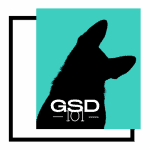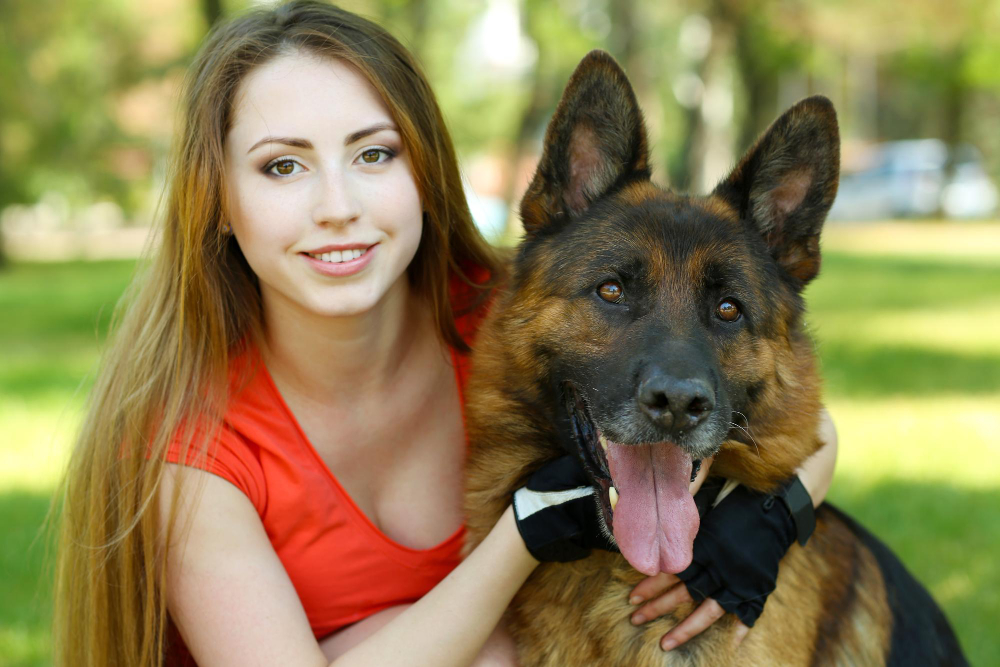Disclosure: This post contains affiliate links. We may earn a small commission if you decided to make a purchase, at no additional cost to you.
German Shepherds have a tendency to experience digestive issues. German Shepherds with sensitive stomachs require dog owners to pay special attention to everything their dog takes in. That said, finding the best food for your canine friend is worthwhile. It will go a long way in minimizing those digestion fallouts.
Proteins are the main contributors to food allergy and intolerance. The best food for a German Shepherd with a sensitive stomach must contain fewer proteins like chicken, turkey, and beef. It should also contain probiotics, flaxseed oil, and sunflower oil (rich in omega-3 & 6 fat) to enhance their digestive health and bowel movement.
In this article, we will discuss some of the common causes of sensitive stomachs in GSDs, foods to avoid, and what to do to soothe your dog. We will also share some of the best dog foods formulated for a sensitive stomach that you can try out.
Also read: Best Dog Food For German Shepherds with Diarrhea
Is it common for German Shepherds to have a sensitive stomachs?
German Shepherds of all ages are more likely to have sensitive stomachs than any other breed.
This is mainly because of their body structure (deep yet narrow chest) which makes them prone to GDV (Gastric Dilatation and Volvulus), among other digestive problems. They also tend to have insufficient gut flora, digestive enzymes, and bacterial overgrowth in the gut than most other breeds.
What causes sensitive stomachs in German Shepherds?
As mentioned, German Shepherds are generally more prone to stomach upsets and digestive problems. These stomach problems are often mild in many German Shepherds and usually resolve by themselves. In some dogs, however, the symptoms can be severe and intermittent, and one must see a vet to rule out anything serious.
Signs and symptoms that a dog has a sensitive stomach
Here are the most common signs indicating your German Shepherd is very likely to have a sensitive stomach:
- Loose stool
- Vomiting
- Gas
- Diarrhea
- loss of appetite
- Bloating
- Black stool
- Abdominal pain
- Anemia
- General body weakness
Causes of sensitive stomach in German Shepherds
Some GSDs are just born with a sensitive stomach, while for some, it is due to food allergies. However, most of them are centered around the dog’s digestive system. Some of the common causes include:
- Changes in food and feeding patterns
- Changes in weather
- Infections (viral, bacterial, or parasitic)
- Accidental poisoning
- Ingredients such as corn, and wheat gluten, among others.
Also, conditions such as stomach tumors, obstruction, gastrointestinal ulcers, intestinal bowel disorder, and bloat (GDV) cause GSDs to have a sensitive stomach.
“GDV is a condition where the stomach twists and then fills with gas. Or the other way around—no one is sure whether it bloats then twists, or twists then bloats.” Dr. Katie Grzybi, Pet MD
More on German Shepherd Allergies

- Most Common German Shepherd Allergies: What You Need to Know
- How to Help Your German Shepherd With Allergies?
- Ear Allergy in German Shepherds: Everything You Need to Know
- Chicken Allergy in German Shepherds: Everything You Need to Know
- German Shepherd Skin Allergies: Best Tips for Relief
- How to Stop Itching in German Shepherds? Effective Remedies Owners Use
- You may also like:
- Is Pet Insurance Worth It for Your German Shepherd Dog?
- Is Grain-Free Good for German Shepherds?
- Worst Dog Food for German Shepherds: Things to Avoid
- Best Dog Food for German Shepherds with Sensitive Stomach
- German Shepherd with Diarrhea: A Feeding Guide
- Dog Diarrhea: Simple and Effective Home Remedies That Dog Owners Use
- Constipated Dog: Causes and Easy Home Remedies
Food allergy vs food intolerance
Like humans, German Shepherds are also intolerant to some foods such as dairy, eggs, and wheat. This means they can only consume minimal amounts of the foods they are intolerant to.
Some are totally allergic and cannot consume anything containing the allergen before buying dog food. It is important to assess what foods your dog can and cannot consume.
How serious can sensitive stomach become?
If left unattended, sensitive stomach in German Shepherds can lead to serious digestive problems. The conditions can sometimes be fatal, especially when accompanied by symptoms like continuous diarrhea.
What food causes sensitive stomach In dogs?
The most common foods that cause stomach sensitivity in dogs include:
- Chicken
- Dairy
- Beef
- Lamb
- Pork
- Wheat
- Soy
Certain ingredients often put in dog food may also cause a sensitive stomach. According to 45-year veterinarian Dr. Marty Goldstein, these are ingredients such as preservatives, fillers like wheat, barley, corn, and white rice, as well as meat meal and meat by-products like undeveloped eggs.
How to treat German Shepherd Dogs with a sensitive stomach
The first course of action to take when you realize your canine friend has a sensitive stomach is to identify the cause. To do this, observe everything that the dog is taking in. While at it, ensure your dog is not feeding from bins or litter trays.
Start by eliminating the usual culprits we already mentioned- meat, fish, chicken, and other sources of proteins. Proteins are the main cause of stomach upsets in German Shepherds. Also, check for high-fat foods and low-quality ingredients; these are also common culprits. Once the main cause is identified, finding remedies and treatment options is easier.
If the symptoms are not severe, you can help soothe your dog by:
Managing their feeding and switching their food
First thing first, fast them for 12 to 24 hours to allow for their digestive system to rest and reset then:
- Switch to a limited-ingredient diet that contains very few ingredients and a single protein or
- Introduce bland food to minimize gastrointestinal (GI) distress. Bland foods are easy to digest and soothing to the stomach. They include boiled lean meat such as chicken breast, hamburger, or ground turkey and starch such as white rice or sweet potato.
- Divide their meals into small portions that won’t overwhelm their digestion
Managing the symptoms
If they have a high fever, diarrhea, or are vomiting:
- Monitor their temperature
- Keep them hydrated with both water and a Pedialyte solution to replace lost fluids
- Feed your dog with homemade dog food. See this video below where Dr. Jones shows you a “vet-approved” recipe that is great for dogs with digestive issues.
Administering Medication
Under the supervision of your vet:
- Administering over-the-counter medications like Pepto Bismol and Immodium.
- Introducing probiotics and prebiotics to their diet to restore beneficial bacteria in their GI tract.
If the symptoms are severe or your dog already suffers from other underlying medical conditions, your dog will require professional treatment. A proper diagnosis will help rule out any serious medical concerns and offer your dog much-deserved relief.
Best dog food for German Shepherds with a sensitive stomach
1. Best dry dog food for sensitive stomach and skin
Hill’s Science Diet Dry Dog Food
Hill’s Science Diet is an adult dry dog food highly recommended by vets.
- This adult dry dog food promotes digestive health while nourishing skin
- A source of prebiotic fiber to support a balanced gut microbiome in your grown dog
- This dog food is formulated to be highly digestible for optimal nutrient absorption & easier stool pick-up
- Packed with vitamin E & Omega-6 fatty acids to help your grown dog get a lustrous coat and healthy skin
- Made in the USA with global ingredients you can trust
2. Best wet dog food for skin and stomach care
Blue Buffalo Basics Skin & Stomach Care, Grain Free Natural Adult Wet Dog Food
- This grain-free dog food features a single protein source of real turkey to support healthy muscle maintenance and contains NO chicken or beef
- Basics wet dog food contains NO chicken (or poultry) by-product meals, NO corn, wheat, soy, dairy or eggs, and NO artificial flavors or preservatives
- Contains twelve (12) 12.5-oz cans of BLUE Basics Skin & Stomach Care, Grain Free Natural Adult Wet Dog Food, Turkey
3. Best grain-free limited ingredient dry dog food
Wellness Simple Natural Grain Free Limited Ingredient Dry Dog Food, Turkey and Potato Recipe
- All natural, limited-ingredient recipe crafted with a single source of protein from turkey, and expertly balanced with easily digestible carbohydrates from potatoes, without any extra fillers.
- Suitable for dogs with food sensitivities & allergies
- Contains natural prebiotics for a healthy digestive system, vitamins for a strong immune system, taurine for a healthy heart and omega fatty acids for a healthy coat and skin.
- No corn, wheat, or soy
- Made in USA: Recipes crafted with wholesome, non-GMO ingredients chosen for their nutritional benefits
4. Best probiotic soft chews with natural digestive support and occasional diarrhea & constipation
PetHonesty Digestive Probiotic Soft Chews for Dogs
Many current dogs owner reports probiotics can work magic for their German Shepherds with sensitive stomach.
PetHonesty has some of the best probiotics soft chews that help to support the good health of the digestive and bowel system as it contains both probiotics and digestive enzymes. In addition, these probiotic chews help boost the dog’s immunity, enhance digestion and absorption of nutrients, and reduce diarrhea, vomiting, and other symptoms of a sensitive stomach.
These vet-recommended chews can be fed to GSDs of all sizes and are made with natural ingredients.
How to care for a German Shepherd with a sensitive stomach?
Caring for your dog goes a long way in preventing any stomach flare-ups, especially if they already have a sensitive stomach. Some of the things you can do include:
- Sticking to the dog’s diet and only making gradual changes when transitioning
- Changing the ratio of the old food to the new food slowly over the course of 10 days while observing for any changes
- Avoid feeding them one large meal instead, dividing it into two or three meals.
- Feeding grain-free foods
- Maintaining a diet with probiotics and prebiotic supplements
- Buying the right feeding bowl if your dog is the kind that scarfs down all their food quickly
- Keeping off inexpensive treats and foods and instead opting for high-quality ones with real ingredients.
- Staying up to date with the dog’s vaccination and parasite prevention to minimize infections and illness.
When To See A Vet?
While home remedies may be appropriate for most symptoms, we recommend taking your dog to the vet straight away if your dog is:
- Running a high or low fever. Your dog’s temperature is considered high when its 102◦F or higher and considered low when its 99◦ or lower
- Lethargic
- Looks dehydrated
- Has non-stop diarrhea
- Has continual vomiting
- Has blood in their stool
- Drooling
- Has a distended abdomen
These could be serious conditions that need urgent attention from a vet.
Conclusion
Sensitive stomachs in GSDs is mostly centered around food which is why it’s important to choose dog food specially formulated for a sensitive stomach. These foods often contain probiotics, prebiotics, and other vitamins and minerals that help support digestive health as well as bowel movement health. Be sure to consult your vet before settling on any food.

More posts on feeding your German Shepherds

Must read:
- The Best & Worst Dog Foods Ever – According to a 45-Year Veterinarian
- Worst Dog Food for German Shepherds
- Is Grain-Free Good for German Shepherds?
- How to Stop Food Aggression Towards People in German Shepherds?
Choosing the best dog food:
- The Best Food For German Shepherd Puppies
- Best Cheap Dog Food for German Shepherds (Dry and Wet Food)
- Best Dry Dog Food for Your German Shepherd Puppies: How to Choose?
- The Best Dog Food for a 12 Months German Shepherd
- What To Look For When Buying Dog Food for German Shepherds?
- Is Royal Canin German Shepherd Dog Food Any Good? Read This First
On feeding your German Shepherd:
- How Much Does It Cost to Feed a German Shepherd Puppy in the First Year?
- How Much Does an 8-Week-Old German Shepherd Puppy Eat in a Day? A Feeding Guide
- How Much Does a 3-Month-Old German Shepherd Dog Eat in a Day? A Feeding Guide
- How Much Does a 6-Month-Old German Shepherd Dog Eat in a Day? A Feeding Guide
- Can Dogs Eat Vanilla Ice Cream?
- 17 Human Foods That Are Safe For German Shepherds to Eat
- The Benefits of Feeding German Shepherds Raw Food
- How to Feed Your Dog Raw Food on a Budget?
- Is It Ok to Give Raw Meat to My German Shepherd Puppy?
For picky eaters:

Daisy is a pet lover, a passionate content writer, and a digital marketer. When she is not working, she loves to spend time in her garden or in the kitchen. She also loves good food, fun activities, and creating memories with her family.
Daisy is a pet lover, a passionate content writer, and a digital marketer. When she is not working, she loves to spend time in her garden or in the kitchen. She also loves good food, fun activities, and creating memories with her family.







